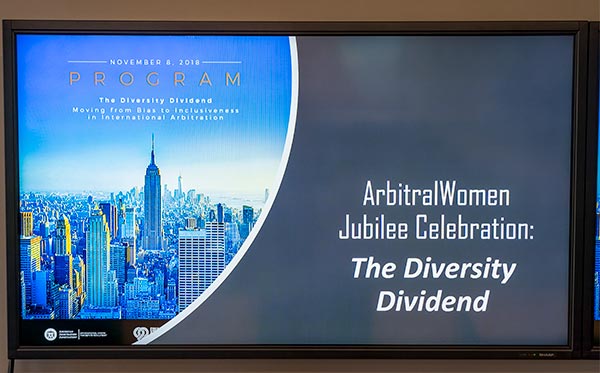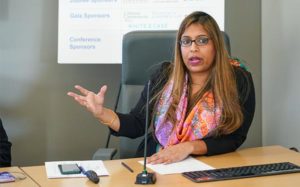ArbitralWomen member Rekha Rangachari, Executive Director of the New York International Arbitration Center (NYIAC), recently published an article titled, “Necessary Change: Planning Past Bias Through the ArbitralWomen Diversity Toolkit™” that appeared in the Spring 2020 issue of the NYSBA New York Dispute Resolution Lawyer.
Rekha Rangachari is well-positioned to write about the ArbitralWomen Diversity Toolkit™ given her role on the ArbitralWomen Diversity Toolkit™ Committee and her personal experience in delivering ArbitralWomen Diversity Toolkit™ training programs.
Additionally, she was instrumental in organising and ArbitralWomen’s full-day conference in New York titled “The Diversity Dividend: Moving from Bias to Inclusiveness in International Arbitration” on 8 November 2018 at which the ArbitralWomen Diversity Toolkit™ was formally launched. This celebratory event was generously hosted by the American Arbitration Association-International Center for Dispute Resolution (AAA-ICDR) at its midtown New York headquarters. She also led a panel session at the conference.


The ArbitralWomen Diversity Toolkit™ focuses on recognising unconscious biases and how attitudes, experience, and education build these internally in the brain. Time is spent exploring how unconscious biases interfere with rational decision-making, with exercises and focused discussions encouraging participants to step away from their comfort zone and confront such biases live. The ArbitralWomen Diversity Toolkit™ underscores the research-driven data that diverse groups make better decisions, foster creativity and better management, recognised by many as important for any company’s financial bottom line.As described in the article by Rekha Rangachari, the ArbitralWomen Diversity Toolkit™ is a full-day training session. ArbitalWomen certified trainers offer a multi-media participatory experience including video clips, mini-lectures, and guided small group sessions. Participants are asked in advance to take at least two implicit association tests from Harvard’s “Project Implicit” to better understand how conscious and unconscious biases operate on a personal level, with suggested reading to bring relevant topics, theories, and statistics to the main stage.
During the live segments of the ArbitralWomen Diversity Toolkit™ training programme, participants dive into the empirical metrics, underscoring that what can be measured can be changed. The training program culminates in brainstorming sessions to create individual strategy lists targeting goals and specific actions to achieve progress.
The research and work behind the development of the ArbitralWomen Diversity Toolkit™ was made possible thanks to a generous grant from the AAA-ICDR Foundation, a non-profit organisation chaired by ArbitralWomen member Edna Sussman.
More information about the ArbitralWomen Diversity Toolkit™ can be found here.
The article by Rekha Rangachari on the ArbitralWomen Diversity Toolkit™ can be accessed here if you are a NYSBA member.
Submitted by Dana MacGrath, ArbitralWomen President and Investment Manager, Legal Counsel at Omni Bridgeway

